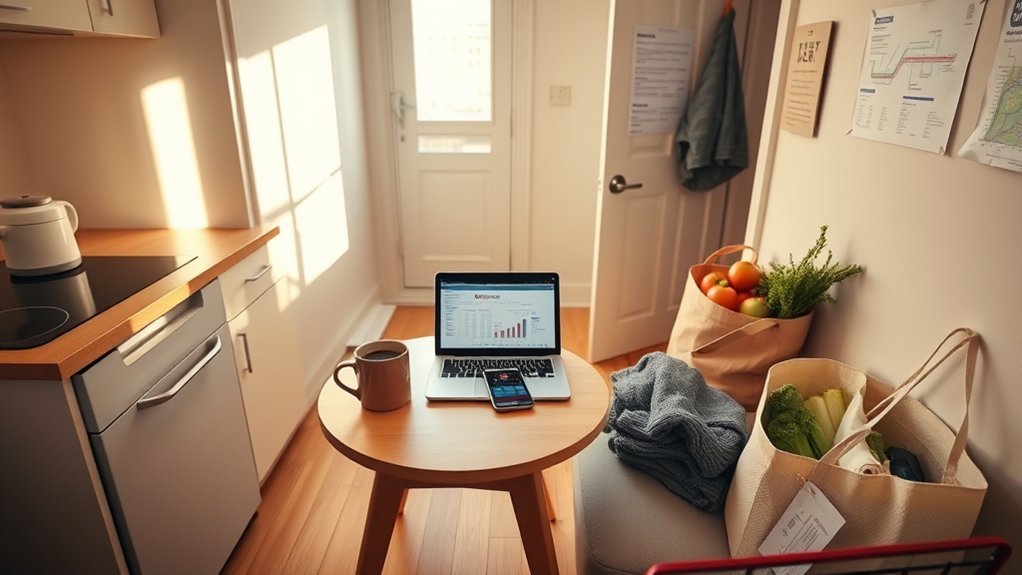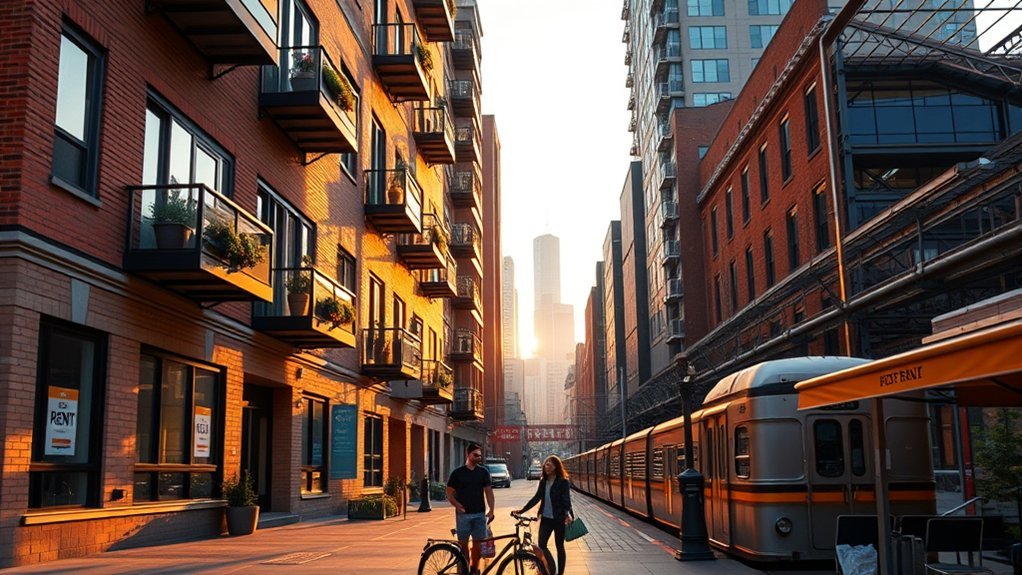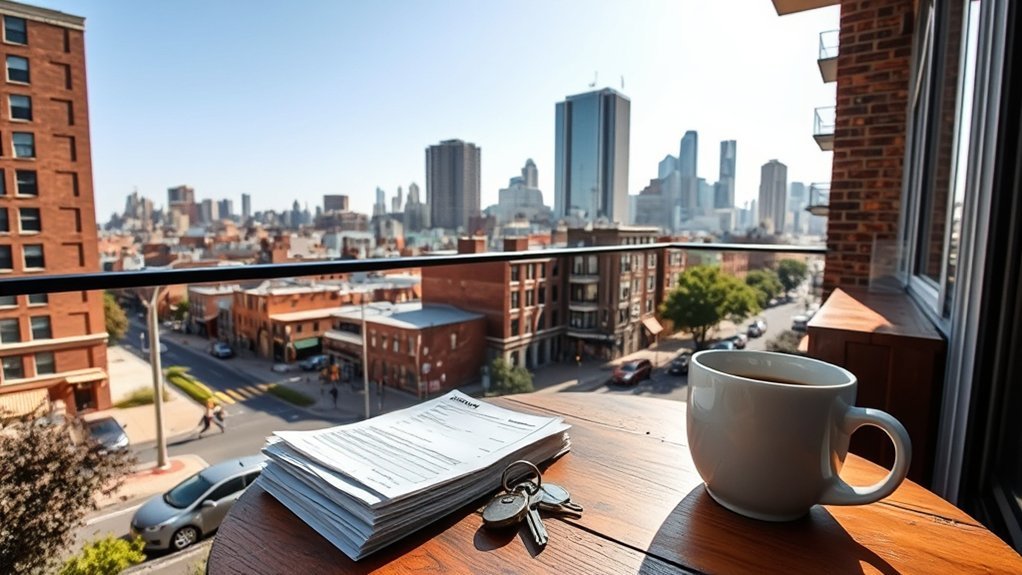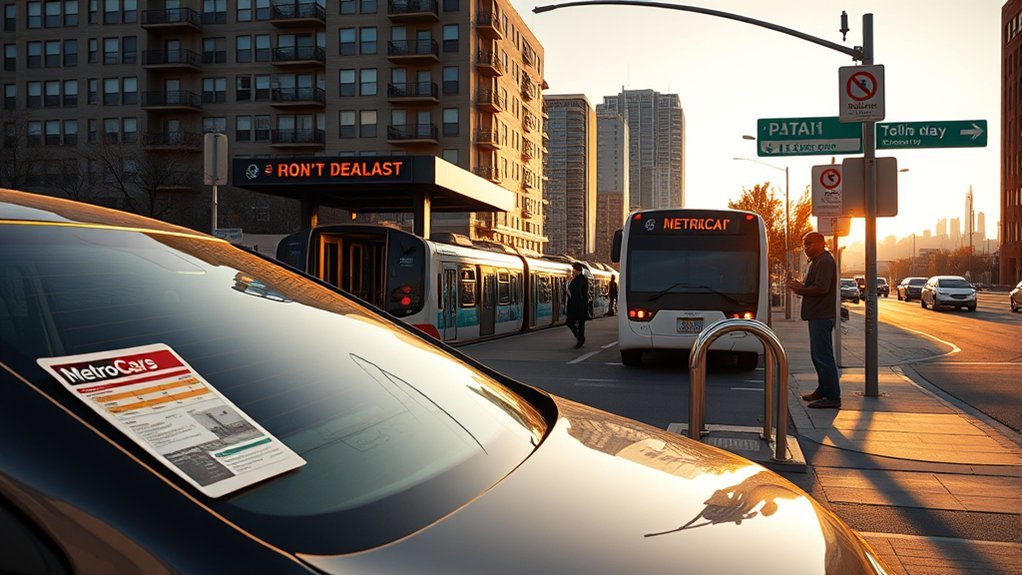If you’re weighing life in Jersey City, expect higher-than-average costs and housing to eat the biggest share of your budget. Monthly essentials for a single person typically land between $3,000 and $4,500 depending on rent, commute, and lifestyle choices. I’ll break down rent trends, utilities, transit costs, taxes, and income needed to cover it all so you can see where to cut costs or aim for higher pay.
Jersey City Cost of Living Overview & Index

Expect Jersey City to cost noticeably more than the U.S. average — most indexes put the city about 26–44% higher, driven largely by housing and transportation. You’ll see the cost of living index reflect that gap: metro CPI rose about 6.0% year-over-year, with energy up ~8.1% and food ~7.8%, so your monthly budget will feel pressure beyond rent and mortgage.
Housing costs dominate: median home price ranges roughly $587,000–$782,000 and average rent in Jersey City for small units commonly runs $2,300–$3,500+ per month. Transportation costs are the other big driver, contributing roughly 11% of regional household spending versus housing at about 39%.
Average household spending in the metro is near $77,200 annually (U.S. ~$64,187), and studies suggest a solo resident needs substantially higher income here to be comfortable. Use these metrics to set realistic expectations and prioritize housing and transit when planning your budget. Additionally, understanding building costs can provide insights into long-term financial planning when considering homeownership in the area.
Monthly Budget Breakdown for a Single Person

Start by budgeting rent and utilities first: expect a one-bedroom to run about $2,310–$3,484 monthly, plus another $300–$560 for phone and utilities.
Plan $300–$700 for groceries and eating out, and allocate $150–$650 for transport depending on whether you use PATH/NJ Transit or own a car.
Altogether, aim for roughly $3,000–$4,500+ per month as your working target, adjusting for housing choice and commute. Additionally, consider the potential for long-term savings from investing in home fitness equipment to promote a healthier lifestyle and reduce healthcare costs.
Rent and Utilities
Although housing costs vary by neighborhood, you should plan on rent and utilities taking the biggest slice of your monthly budget in Jersey City: a one-bedroom averages about $3,484 per month, and basic utilities (electric, heating, water, garbage) typically add $150–$300 — with Jersey City leaning toward the high end.
Expect the Average Rent for a one-bedroom apartment to dominate your monthly rent line; that 793 sq ft average reflects mid-market units. Your utilities bill will often include an energy bill averaging near $195, but budgeting $200–$300 is prudent.
Combined housing costs (rent plus utilities) commonly make up around 39% of metro-area spending, so factor this into affordability checks and set aside a buffer for seasonal energy spikes.
Food and Groceries
Typically, you’ll spend about $300–$500 a month on groceries in Jersey City, with prices roughly 4% above the U.S. average, so plan around $350 as a practical baseline.
You’ll see common item prices like milk ~$4.88/gal, bread ~$4.09, eggs ~$3.25, chicken ~$6.00/lb, and apples ~$2.41/lb, so food choices directly affect your monthly bill.
Food is about 12% of metro household spending, smaller than housing or transport, but eat out habits raise costs quickly—a casual dinner for two averages $87.
- Meal plan and buy staples in bulk.
- Use mid-range supermarkets and compare price per unit.
- Limit frequent dining out to control the monthly groceries line.
Monitor prices to keep Average Cost of Living forecasts accurate.
Transport and Transit
Figure your monthly transport budget between about $200 and $650 if you rely on public transit, and up to $1,075 if you drive and include loan, insurance, parking and upkeep. In Jersey City you’ll weigh NJ Transit rail, PATH, buses and occasional ride-share. A NJ Transit monthly transit pass from Newark to NYC runs about $200; PATH single rides are $2.75. Driving adds loan (~$457), insurance ($207–$280), gas, tolls and parking. Budget an extra $50–$150 for nights/weekends beyond a base pass. Aim for transportation spending near 11–15% of income to keep commute costs manageable.
| Mode | Typical monthly cost | Notes |
|---|---|---|
| NJ Transit | $200 | Monthly rail pass |
| PATH | $100–$200 | Frequent riders save |
| Driving | $650–$1,075 | Loan, insurance, parking |
Average Rent and Rental Market Trends

Because Jersey City sits so close to Manhattan and has limited homeownership, you’ll find rents are high and have climbed sharply over the last decade — average rents run about $3,484/month for a 793 sq ft unit, with many 1‑ and 2‑bedroom listings reporting near $3,811 and $4,682 respectively.
You should expect low vacancy, strong rent growth, and persistent demand from NYC commuters; the homeownership rate sits near 29%, keeping more people in the rental market.
Neighborhood variation matters: Bayfront and Liberty State Park can average around $2,113, while downtown and waterfront push city averages up. Historical rent growth has added roughly $1,100/month since 2015.
- Budget for higher rent shares of income compared with national averages
- Compare neighborhood rents before committing to a lease
- Factor commute convenience and amenities into rent decisions
Moreover, understanding average rent trends in areas like Jersey City can provide insights into your budget planning. Use data-driven comparisons (price-to-rent ratios, recent listings) when evaluating options; they’ll help you decide whether current Jersey City rent levels fit your budget and priorities.
Home Prices, Ownership Rates, and Buying Vs Renting

After weighing rent levels and neighborhood differences, you’ll want to compare those monthly costs against buying—both in cash flow and long-term wealth terms.
Jersey City cost data shows a homeownership rate around 29% and median home prices near $587,000 (some datasets range $635k–$782k). Condos cluster near $612,000; single-family and townhouses sit near $567,500 and $557,950.
Compare that to median rent, which ranges roughly $2,380–$3,484 monthly depending on unit and area.
When evaluating buying vs renting, use price-to-rent ratios and local salary trends. A $560,000 sale versus $39,900 annual rent yields about a 1:14 ratio, which can favor buyers over time if appreciation holds.
Factor in property taxes, closing costs, maintenance, and your mortgage rate. Also weigh proximity to New York City premium and potential rental demand if you plan to rent out. Additionally, consider budgeting for probate lawyer fees if you plan to establish a will or trust for your new property.
Crunch cash-flow scenarios and a 5–10 year horizon to see which option aligns with your finances and goals.
Utilities, Internet, and Household Bills

For planning month-to-month expenses in Jersey City, expect utilities, internet, phone and household bills to add several hundred dollars to your budget — typically $366–$656 for core utilities (electricity, heating/cooling, water, garbage), plus $50–$100 for broadband and $98–$209 for phone service depending on plan.
You’ll see the average electric bill near $114 and a water bill around $72, with overall energy costs often about $194.50 and roughly 10% above U.S. averages.
Factor in mortgage or rent when tallying monthly household costs.
- Treat Jersey City utilities as a fixed baseline: $366–$656 for core services.
- Plan $50–$100 for Internet and phone bills for reliable broadband and basic plans.
- Add a 10–20% buffer for utility bills seasonal spike in winter (heating) and summer (cooling).
- Regular inspections of HVAC systems can help prevent unexpected costs related to air conditioning maintenance.
Track usage, compare providers, and review bills yearly so your monthly utilities stay predictable and you avoid surprises in your household budget.
Grocery, Dining, and Everyday Essentials Costs

Now that you’ve accounted for utilities and household bills, plan your food and everyday supplies with similar scrutiny: groceries in Jersey City run about 4% above the U.S. average, so expect staples like a gallon of milk near $4.88, a loaf of bread around $4.09, and a dozen eggs about $3.25.
For Grocery budgeting, track Prices Per Item: beef round and chicken fillets hover near $6.00/lb, apples $2.41/lb, oranges $2.25/lb, and most fruits $2–2.50/lb. Your Monthly Grocery Spending will typically fall between $300–$500 for one person, depending on habits and buying choices.
Dining Out is costlier—expect a casual dinner for two around $87, a cappuccino about $4.81, and a 500ml beer near $6.
Everyday Essentials like toiletries, cleaning supplies, and a mid-range bottle of wine (about $12) also skew above national norms. Use a simple spreadsheet to log Prices Per Item and adjust store choices or meal planning to control overall spend. Additionally, keeping track of average repair costs can help you budget for unexpected expenses like computer repairs.
Transportation, Commuting, and Auto Expenses

Because transportation eats a sizable share of household budgets in Jersey City, you’ll want to plan carefully: transit accounts for about 11% of metro household spending, PATH rides cost $2.75 each, NJ Transit one-way fares to NYC run near $15.75 (making monthly passes — roughly $200 for Newark→NYC — a smart choice for commuters), while driving brings fuel (~$3.31–$3.74/gal), typical auto loans around $457/month, and full-coverage insurance roughly $207–$280/month; add parking, tolls, and ride-hail surcharges and your monthly transport bill can quickly exceed a basic pass.
You can cut Monthly Commute Costs by choosing Public Transportation, flex passes (~20% savings), or living near PATH. If you drive, factor Gas Prices, Auto Insurance, loan payments, Parking and Tolls, and maintenance. Additionally, consider potential expenses for exhaust leak repairs that may arise from regular vehicle wear and tear.
Practical checklist:
- Compare monthly passes vs pay-per-ride for Commuting patterns.
- Estimate car ownership total: loan + insurance + gas + parking.
- Consider living near transit to avoid Parking and Tolls and lower overall Transportation costs.
Healthcare, Childcare, and Family Expense Drivers

Now let’s look at how healthcare and childcare eat into monthly budgets so you can plan realistically.
Local estimates put family healthcare (premiums plus out‑of‑pocket) at about $1,197/month and child care for two children near $1,800/month, making them among the largest non‑housing expenses.
We’ll break down typical healthcare components (premiums, prescriptions, visits) and the caregiving costs and options that drive those childcare figures. Additionally, understanding the average fees for green card applications can help families account for potential immigration costs when budgeting for healthcare and childcare.
Healthcare Cost Breakdown
Although healthcare isn’t the largest single line item, it meaningfully reshapes family budgets in the Jersey City metro: metro consumer data put healthcare at roughly 6% of household spending, and the Economic Policy Institute estimates a family of four faces about $1,197 per month in health-care costs.
You should plan a monthly healthcare budget that accounts for rising doctor visit prices—regional averages beat national figures—and for prescription and specialist costs that add materially to out‑of‑pocket spending.
Medical inflation and broader CPI pressures push totals higher, so monitor plan deductibles and co‑pays. Key drivers to track include:
- routine visit and specialist fees vs. insurance coverage
- monthly prescription costs and formulary changes
- unexpected procedures and deductible exposure
Balance healthcare costs against childcare costs when setting family healthcare expenses.
Childcare and Caregiving
Juggling childcare and caregiving costs can quickly redraw your household budget in Jersey City: the Economic Policy Institute puts monthly child care for two children at about $1,800 and healthcare for a family of four at roughly $1,197, so together they can top $3,000 against other necessities like housing ($1,958) and food ($815).
You’ll find child care and health care are primary drivers in your monthly budget — childcare costs alone can force both parents to work or seek relatives for help.
Expect additional out‑of‑pocket doctor visits and prescriptions to push health costs above premiums (doctor visits average $122–$173).
When you compare total expenses to EPI’s comfortable family income (~$101,568), location and caregiving options become critical financial decisions.
Taxes, Insurance, and Other Mandatory Payments

Because mandatory charges take a fixed bite out of your budget, you should factor taxes, insurance, and required transportation costs into any Jersey City affordability calculation. You’ll face New Jersey state income tax (progressive, 1.4%–10.75%) and a 6.625% sales tax; both reduce disposable income. Property taxes are significant—calculate as (assessed value ÷ $100) × 2.118%—and add to housing costs beyond average rent and utilities.
Typical monthly mandatory housing-related payments: mortgage (~$2,489 median) or rent (~$2,380–$3,484), plus utilities (~$150–$366) and property or renter’s insurance.
Consider these recurring non-negotiables:
- Auto-related: auto loan (~$457), auto insurance (~$207–$280/month)
- Transit: NJ Transit rail passes (~$200/month) or PATH/pay-per-ride commuter fares
- Tax burden: payroll withholding and estimated payments if self-employed
Additionally, understanding probate lawyer costs can help you manage potential legal expenses that may arise in your financial planning.
Build these into your monthly budget to see true cost of living in Jersey City and avoid surprises when comparing take-home pay to expenses.
Salaries, Occupations, and How Much You Need to Live

If you want to understand what it takes to live in Jersey City, start with pay: the average annual salary is about $86,000 (roughly $7,167/month), but that often falls short of local “comfortable” benchmarks — one estimate puts a single person’s comfortable income near $135,000/year — because housing and transportation costs are high.
You should compare that average salary to typical occupations: protective services, community and social services, legal, and management are common, while healthcare roles pay more hourly (RN ≈ $36/hr; LPN ≈ $26/hr).
For budgeting, the metro-area household spending runs about $77,204/year, with housing expenses as the largest share.
To keep rent cost at or below 30% of income in pricier neighborhoods you’d need roughly $7,700/month (~$92,400/year).
Additionally, those considering starting a group home should be aware of initial startup costs that can vary significantly based on location and type of group home.
Use those figures to build your monthly budget and assess whether your occupation’s pay will cover the local cost of living, including rent, transit, and essentials, or whether you’ll need roommates or higher income.
Frequently Asked Questions
What Is the Cost of Living in Jersey City, NJ?
You’ll face a high cost of living in Jersey City: expect substantially above‑national averages, with one‑bedroom rents ~$2,300–$3,500, significant housing share of spending, plus notable taxes, transportation, childcare, and utility expenses.
How Much to Live Comfortably in Jersey City?
Like holding a skyline in your palm, you’ll need about $135,000/year to live comfortably in Jersey City as a single person. That’s roughly $11,250/month, driven mainly by high rents, transport, and essentials.
How Much Is the Cost of Living in New Jersey per Month?
You’ll need about $5,000–$8,500 monthly in New Jersey depending on location and household size; high-cost areas push totals toward $7,000–$8,500, while lower-cost towns can be closer to $5,000 per month.
What Is the Average Cost of Living Expenses?
You’ll typically spend about $6,400 monthly for a comfortable family-of-four; that reflects housing, food, childcare, transport, and healthcare. Use this figure to plan budgets, prioritize housing, and reduce transport or childcare costs where possible.
Conclusion
Living in Jersey City will push your budget higher than the U.S. average, so can you comfortably cover essentials and rent without stretching? You’ll likely need $3,000–$4,500 monthly as a single person, with housing around $3,484 for a one-bedroom and utilities, groceries, and transit adding several hundred more. Practical choices—roommates, higher income, or commuting trade-offs—make the difference between financial stress and stability in this data-driven market.


